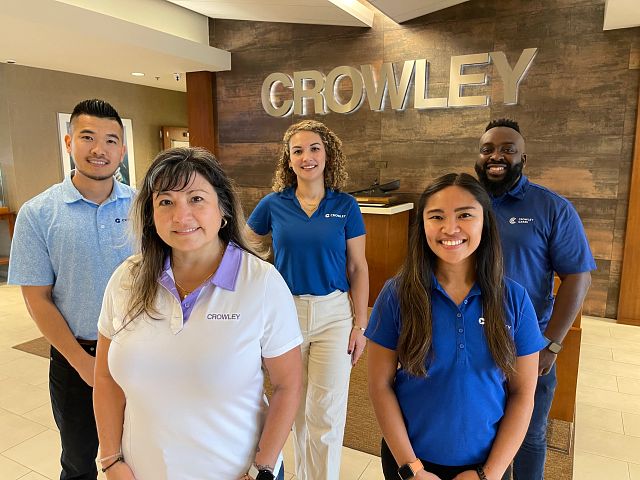
Employee Emergency Fund
Frequently Asked Questions
General

The Crowley Cares Employee Emergency Fund (CCEEF) was created, in partnership with the Emergency Assistance Foundation (EAF), to assist Crowley employees who find themselves in personal crises or emergencies requiring financial assistance.
It is designed to provide emergency funding to those in need based on the objective analysis by EAF based on the information provided by an applicant.
Donations
While the CCEEF has been initially funded by Crowley, employees, families and friends are encouraged to support the CCEEF to sustain its availability and increase its impact on our employees in need.
Anyone can donate to the CCEEF, both individuals and external organizations seeking to support Crowley employees.
Donations can be made through Crowley’s Emergency Assistance Foundation page for the Crowley Care Employee Emergency Fund.
In the U.S. all gifts are tax deductible to the extent allowed by law.
Yes, no matter the donation amount or platform, you will receive an acknowledgment via email from donations@emergencyassistancefdn.org
The CCEEF is set up to provide intentional and equitable assistance to employees who need it. Due to regulations set by the Internal Revenue Service (IRS), donations cannot be earmarked for specific individuals.
Not at all. Donating to the CCEEF is completely voluntary and eligibility for assistance is based upon need and qualifying circumstances. In addition, no applicant is entitled to receive a grant based on their history of contributions.
Applications
The CCEEF was created for all full-time, non-temporary employees of Crowley globally, both union and non-union.
- Natural Disasters (floods, wildfires, tornados, earthquakes, tsunamis, etc.)
- Terrorist actions
- Disasters resulting from an accident involving a common carrier (bus, train, ferry, aircraft, etc.)
- Events impacting primary residence: fire, flood, or unusual life-altering expense not covered by insurance.
- Serious illness or injury
- Domestic abuse
- Death
The CCEEF was designed to provide financial assistance to as many eligible employees as possible in accordance with its set criteria, United States IRS regulations and fund balance. EAF, the CEEFF’s administrator, strives to award grants whenever possible, but there are many factors that determine whether a grant can be awarded.
- The most basic criteria include the following:
- You or your eligible dependent (including your spouse/domestic partner) were impacted by a designated event.
- Due to the impact of the designated event, you or your eligible dependent (including your spouse/domestic partner) incurred one or more of the CCEEF’s qualified expenses.
- Your application meets the following additional conditions:
- You are applying for the grant within 180 days after the event.
- Standard grant awards are limited to two every 12 months.
- If your previous application was not approved, you must wait 30 days before reapplying.
- Documentation of the event that has impacted you or your eligible dependent (including your spouse/domestic partner), as well as proof of the resulting expense(s) for which you are seeking assistance
Actual grant award amounts are based on individual financial need as demonstrated through required documentation in the grant application. The grant maximum is $1,000 USD and the minimum amount that can be requested is $500 USD..
A tiered approach is in place to ensure that the monetary values for each grant amount are equitable across geographies. “Regional Grant Tiers” apply for this grant and are based on the World Bank Financial Tiering system
The CCEEF considers the applicant’s spouse/domestic partner, minor children, and others for whom the applicant is financially responsible as eligible dependents.
The applicant’s parents, grandparents, or other relatives are not considered eligible dependents unless the applicant claims them as a dependent when filing taxes and can provide supporting documentation as proof.
A domestic partner is defined as “an ongoing and committed spouse-like relationship between adults.”
Grants from the CCEEF are considered tax-free for grant recipients who are subject to United States IRS tax regulations. For recipients outside the United States, the tax treatment of your grant will differ based on local policies/laws.
To apply for a grant, click the “Apply for a grant” button on www.crowley.com/crowley-cares under the Crowley Cares Employee Emergency Fund section. Be sure to look for any relevant emails in any filtered inboxes and spam or junk folders.
Please review the Grant Application Guide at eafrelief.org/appresourcedocs for step-by-step grant application instructions.
No. If you think a fellow team member would benefit from a grant, please share information about the CCEEF with them. In the case of a team member who is incapacitated, a family member or manager can apply on their behalf.
The answer is no. There are no guarantees about grants. Each grant request is reviewed by our third-party partner, EAF, to determine available personal resources and actual need and then to decide the amount of each grant. Employees are assigned a case worker who confidentially reviews personal data as part of the process for determining eligibility.
Grant funding is dependent upon the liquidity of the CCEEF.
Once an application is completed and submitted to EAF, a caseworker will be assigned to review the information. If any additional information or supporting documentation is needed, they will let you know. After the initial review is complete and all information has been received, the application will enter a final stage of review. You will be notified by email if your grant has been awarded or not.
The processing of grant payments could take up to two weeks.
Please review the Grant Payment Guides at eafrelief.org/appresourcedocs for additional detail.
Yes. Your personal information is only used to determine your grant eligibility and the grant amount unless you as the applicant opt in to share additional details with the sponsoring organization under certain circumstances.
Non-identifying statistical information will be reported to the sponsoring organization on a periodic basis in an effort to improve the CCEEF.